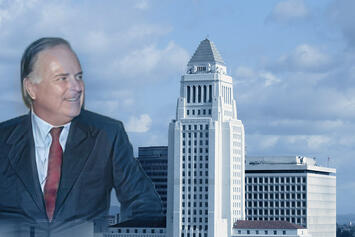
The death last week of former Los Angeles mayor Richard Riordan is a reminder of both how low the city’s political culture has sunk and how strong leaders can help turn around a seemingly hopeless situation.
Riordan, who died at 92, was no natural politician. The native of New Rochelle, New York, and Princeton graduate moved to Los Angeles in 1956. He was awkward, sometimes disheveled, and held onto conservative Catholic ideas in a city dominated, even by the time of his election in 1993, by secularists, liberals, unions, and ethnic nationalists.
Riordan won office in the wake of the 1992 Rodney King riots, which resulted in more than 50 people killed, more than 2,300 injured, thousands arrested, and property damage totaling about $1 billion. In leading the fractured city, Riordan proved remarkably successful, helping to reduce crime, slow economic decline, and push a series of improvements. “He was such a contrast to what we have today,” notes long-time political observer Jack Humphreyville. “Riordan got things done, while people like [former mayor, now ambassador to India] Eric Garcetti just talked a big game.”
In her statement marking Riordan’s passing, new mayor Karen Bass graciously highlighted his contributions, both in office and through his private philanthropy: renovating the city library, building Disney Hall and the Alameda Corridor (a critical trade route through the city), and spearheading the construction of the Cathedral of Our Lady of the Angels. Most critically, Riordan helped engineer a reduction in crime, an issue that today’s progressive leaders, like Los Angeles County District Attorney George Gascón, continue to avoid addressing.
Riordan’s triumph makes a stark contrast with the failed mayoral campaign last year launched by billionaire Rick Caruso. Unlike Riordan, who never denied his Republican or Catholic affiliation, Caruso switched identities, after having been a GOP stalwart for decades, and declared himself a Democrat. True, L.A. in 2022 was not the wreck it was after 1992, but the city’s rising crime, disorder, weak economy, rampant corruption, and declining population should have been enough to get Caruso over the top—especially with an estimated $100 million in campaign spending—against a long-time progressive like Karen Bass.
Arnie Steinberg, pollster and strategist for Riordan’s 1993 triumph, suggests that Caruso never made the kind of intimate connection with Jewish, Latino, and Asian voters that Riordan cultivated. Caruso was more aloof, elegant to a fault, and surrounded by largely Democratic advisors, who managed his campaign funds with what seems alarming inefficiency. In contrast, Riordan appealed as a friendly Mr. Magoo, and his willingness to stick to positions, such as a personal disdain for abortion, that alienated some voters at least suggested genuineness. He also chose a political strategy, notes Steinberg, that focused first on mobilizing Republican and Independent voters. He generated support throughout the city’s still-vibrant business community and connected well with small-business owners, particularly those worried about crime and the city’s anti-business government culture.
To be fair to Caruso, however, the city has changed dramatically since Riordan’s time. The city Riordan ran in, notes Steinberg, was more family-oriented and boasted a more diverse economy. Republicans still mattered, counting for roughly one-quarter of registered voters. In the 1993 election, Steinberg estimates that Republicans constituted as much as one-third of the electorate. By 2022, Republicans were barely 16 percent of the electorate.
Read the rest of this piece at City Journal.
Joel Kotkin is the author of The Coming of Neo-Feudalism: A Warning to the Global Middle Class. He is the Roger Hobbs Presidential Fellow in Urban Futures at Chapman University and Executive Director for Urban Reform Institute. Learn more at joelkotkin.com and follow him on Twitter @joelkotkin.
Photo: composite of images from Wikimedia under CC 3.0 License.












